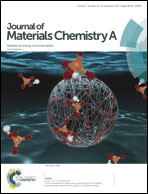A highly efficient electrocatalyst based on amorphous Pd–Cu–S material for hydrogen evolution reaction†
Abstract
Hydrogen evolution reactions (HER) through water splitting draws tremendous attention as a way for generating clean energy. In this process, developing cost-effective, efficient non-Pt electrocatalysts is highly important for HER practical applications. In this work, we demonstrate a highly efficient and stable electrocatalyst based on amorphous Pd–Cu–S material. We found that the existence of abundant bridging S22− and apical S2− species and charge redistribution between Pd and Cu atoms in the material provided significantly enhanced electrocatalytic activity for HER, leading to a small overpotential of 58 mV at 10 mA cm−2 and a Tafel slope of only 35 mV dec−1, which is close to commercial Pt-based catalysts. Furthermore, the material demonstrated excellent electrochemical durability with no performance decrease in HER for 48 h even in 7 M H2SO4 solution, indicating its great potential as a non-Pt catalyst for HER water splitting.



 Please wait while we load your content...
Please wait while we load your content...